Corey Redekop's Blog, page 42
January 17, 2011
Monkey droppings - The Three Fates of Henrik Nordmark by Christopher Meades: For the want of a plum. . .
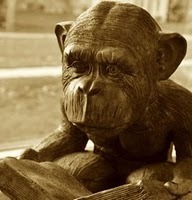 The monkey's been doing some heavy reading lately.
The monkey's been doing some heavy reading lately.Literary heavyweights. Thick tomes of grand themes and ambition.
The monkey needs a beer and something decidedly lighter, just to take the edge off.
The Three Fates of Henrik Nordmark (ECW Press, 2010)
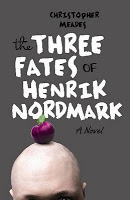
by Christopher Meades
A good loser is hard to find. A great loser is a rare thing indeed.He was neither young nor old, weak nor strong; not fat enough to be obese, but chubby enough that parts of his sides folded over onto the seat next to him on the bus. He smelled a little, but his musty odor - part mildew, part inside-of-a-reptile-cage - wasn't particularly malicious and rarely did it cause great offense. Henrik had no interesting stories to tell. He'd never run through the streets in the middle of the night in a desperate search for condoms or had a girlfriend force him into a sunflower costume for Halloween. In fact, he'd never had a romantic relationship of any kind. Henrik had lived his entire forty-two years in complete obscurity. He was the weed sprouting out of the wallflower; generic in his generality.
To qualify that; loser's ain't hard to find, and even easier in literature. But a great loser - a hapless sort who somehow keeps you coming back for more, despite his or her countless faults and social inadequacies - that's a rare beast indeed. Off the top of my head, I would call out Ignatius J. Reilly, Holden Caulfield, the anonymous narrator of Fight Club, Lee Goodstone, and the nameless fact checker from Bright Lights Big City as being paragons of the species. You can't say that you'd enjoy being around them in person, but reading about them can be an exhilarating experience.
It's a fine line, however, maintaining interest and readability in a character that, in any normal situation, you would likely yawn in the face of, hide in the closet to avoid, or run screaming away from. Some clever wags have labelled this genre 'loser lit,' but you won't hear me call it that. James Patterson, now that's loser lit.
I'd be hard pressed, however, to come up with a bigger loser than Henrik Nordmark. A man of no means, no charisma, no distinguishing characteristics, no anything, Henrik is almost intolerably awful as a lead character.
Almost. Christopher Meades finds a way to combat Henrik's loathsome passivity with a breakneck approach to plotting that throws everything into the mix to see if it stick. And while the resulting novel The Three Fates of Henrik Nordmark may not qualify as high literature, it certainly ranks as one of the goofier good times I've had with recent novels.
Three Fates is a novel of mistakes, accidents, and massive coincidence, all revolving around the black hole that is Henrik Nordmark. A forty-two year old security guard, Henrik has never in his entire life done anything remotely interesting. Yet on one fateful day, Henrik comes face-to-face with his own mortality. Dropping a plum during a grocery store visit, he chases the juicy orb outside and into the street, where his life is saved by a mysterious man in a full tuxedo. Recognizing how close he came to death, and how few people would be at his funeral, Henrik comes to a turning point in his life: "He would turn his life around. He would find something interesting about himself. He would become unique if it killed him."
As Henrik goes about trying to get himself recognized for something, anything - including very strange and whimsical slapstick forays into sexual deviance, drug use, unfocused rage, and clipping his toenails in public - other characters who have somehow fallen into his sphere of influence weave their own tales of misery. Roland is a business analyst who quits his job, mistakenly believing that he won the lottery. Bonnie and Clyde are a long-suffering married couple who each have been surreptitiously attempting to kill the other for months. And most oddly of all, a trio of extremely elderly assassins have been hired to kill Henrik, for reasons left obscure. In a way, the novel begins to resemble some of the early films of Jim Jarmusch and Richard Linklater, following characters as they criss-cross each other's paths, and Three Fates has a great deal of the shaggy charm of those low-budget gems.
This is not to imply that Three Fates is high art, but it is damned entertaining. Meades has a lovely bit of fun with dialogue, such as Henrik's meeting with an employment counsellor:
Meades keeps his many balls in the air, juggling from each plotline and back again, piling on the coincidences, keeping momentum even when the story veers into terrifically unbelievable proportions and the entire structure resembles a particularly intense game of Jenga. That the story begins to resemble the anarchic narratives of the Marx Brothers (by way of the Three Stooges) is a compliment. The three assassins and their escapades are certainly worthy of plaudits, and Roland's desperately silly dive into despair is marked with high style."I want to find a job that makes me unique."
"What's your previous occupation?"
"Security guard," Henrik said.
"Well that's not very unique at all. There are thousands of security guards out there."
"That's my point exactly. I need a job that, by definition, makes me unique."
The man in the green tie picked up the clipboard with the list of occupations. He scanned the sheet for the ones Henrik circled. "Let me see here. Aerospace Engineer. Professional Bodybuilder. Lactation Consultant. Do you have any expertise in these areas? Any aerospace training?"
"No, sir, I don't."
"Any weightlifting or bodybuilding skills?"
Henrik covered his pot belly with his arms. "No."
"What about this last one - Lactation Consultant? Do you have an actual proficiency in this area?"
"Actually," Henrik said, "I wasn't a hundred percent sure what that one was."
What keeps The Three Fates of Henrik Nordmark from taking off and becoming more than a diversion (although an exceedingly funny one) is Henrik himself. Despite his top billing, Henrik is never more than caricature; he is clumsy when the plot calls for it, he is dense only to propel the plot forward, he is hapless beyond belief only because any believable character would have wised up far earlier than he. Henrik is a foil, a device, but he never becomes human. He's a good loser, not a great one. And Meades storytelling, as enjoyable as it is, isn't refined to the point where he can turn such an oblique character into something more substantial, nor is his style as relentlessly hilarious as the titans of comedic writing such as Douglas Adams and Robert Rankin.
But sometimes, all you want is silly, and The Three Fates of Henrik Nordmark fits the bill. Meades shows definite talent, and I look forward to what his imagination unleashes next. The Three Fates of Henrik Nordmark may not change your life, but sometimes that's not what I look for nor need. I don't want The English Patient all the time. Sometimes, I just want Happy Gilmore. And that's a compliment.
VERDICT: MONKEY LIKES A LOT
January 8, 2011
Monkey droppings - Drive-by Saviours by Chris Benjamin
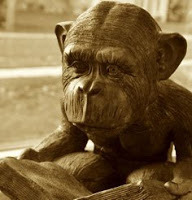 The monkey feels bad about things.
The monkey feels bad about things.The monkey watches a movie about good people helping other people, where everybody hugs at the end after learning heartfelt lessons about something.
The monkey knows he should feel better, but somehow feels even worse. And dirty, like a kitchen rag squeezed dry after wiping up a spill.
Drive-by Saviours (2010)
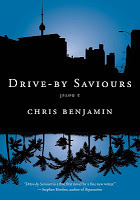
by Chris Benjamin
If there is one genre of art almost guaranteed to raise hackles (mine, anyway), it's that of 'liberal guilt.'
You know the genre. There's a person who feels guilty, and takes it upon him or herself to somehow 'better' the life of someone less fortunate. When done wrong (and it has been done so, so wrong), it usually takes the form of overly-sentimentalized Hollywood hokum (The Blind Side, Freedom Writers, Dangerous Minds, etc). The kind of movie, book, or television show that ends with the audience so damned pleased with themselves, feeling themselves better for having shed a tear for those plucky immigrants/inner-city students/sick kids. And please don't think ill of me, I promise this is not a conservative screed disguised as a book review; I'm as lefty as all get out, but I call shenanigans on such saccharine drivel.
The genre does have highlights, works that somehow transcend the genre with though, imagination, and a lack of bathos. Friday Night Lights, for example, presents realistic portrayals of all involved without over-varnishing of the travails of everyday life (and I hate football, so for me to watch it, it must be freakin' good). Dead Man Walking was a movie that could have gone wrong in so many ways, but gripped me from beginning to end. Half Nelson found a good balance.
My point? It's a fine line between writing a theme and bashing people over the head with it. And I should know; I mean, have you even read Shelf Monkey? Sledgehammer, baby.
Drive-by Saviours, by newbie author Chris Benjamin, skirts this line time and again. But through skill and subtlety of character, Benjamin for the most part pulls it off.
Drive-by tells in alternating chapters the stories of two men; Bumi, an Indonesian immigrant, and Mark, a Toronto social worker. Bumi's life has been one of hardship; brought up in the island of Rilaka, he is removed from his family to enter a newly-established residential school. Bumi is eager to learn, intelligent to a fault, but he suffers from variety of obsessive compulsive tics that make it difficult for him to concentrate, and earn him a reputation as a fairly strange man:
Through a series of mistakes and assumptions, Bumi is forced to flee for his life, leaving his family and taking up a life as an illegal immigrant in Canada.his incessant purification rituals that crossed the line toward self-abuse; his long morning routine of dressing, undressing, and redressing multiple times until he got it just right . . . His use of elbows and feet instead of hands, which were often protected in plastic bags; his strange and complex series of patterned twitches . . . his harassment of strangers as they passed on foot, writing down their names and purposes or fretting inconsolably if they refused to provide the information.
Mark, on the other hand, is a fairly well-off Canadian with little in common with Bumi save a less than perfect childhood. His job as a social worker at a community health centre is undemanding, Mark writing up proposals and plans, seeing people less and less; his clients would "give me the Coles Notes version of all their problems and I made suggestions, like a drive-by saviour."
It doesn't take a genius to see that these two men will cross paths, and it's a tribute to Benjamin's talent as a writer that the trek to that point is almost sheer pleasure. Perhaps by necessity, Bumi's tale is far more interesting, and Benjamin pulls off the neat trick of taking a potentially dark tale and never succumbing to despair. Bumi's life is harsh, but the bleakness never overwhelms either Bumi or the reader. Mark's life, likely more familiar to the average North American reader, is more comfortable than Bumi's, but his life too is full of pitfalls and disappointments. Benjamin is working with a universal theme here, the idea that happiness comes from within, and it is how we strive against obstacles that defines us. It's a far more palatable motif than the aforementioned theme of 'let's help those who cannot help themselves and feel better about ourselves as a result.'
And when the two finally meet, not as social worker and client but as two figures on public transport, Benjamin takes great pains to avoid any clear-cut resolutions. Mark understands Bumi's dilemma, and recognizes his OCD, but such a revelation does not lead to triumphant resolution. Bumi appreciates Mark's efforts, but knows that his life in Canada is not the life he wishes.
At times, Drive-by Saviours veers perilously close to polemic, telling rather than showing, especially with regard to Mark's efforts to help Bumi, but Benjamin's novel only uses their relationship as an anchor to tell the stories of two sad and lonely men, each trying to find their place in the world. While it's a common theme, it's only as strong as the storyteller, and Benjamin proves himself a natural.
VERDICT: MONKEY LIKES A LOT
December 30, 2010
How to survive the holidays, with zombie hints
December 16, 2010
Monkey droppings - the year in review. Book-wise, anyway.
 Well, it's been a helluva year, hasn't it? Seems like every day there was a new travesty on the scene, whether it be physical, political, climatological, theological, sexual, ideological, scatological, or a mix of some or all of the above.
Well, it's been a helluva year, hasn't it? Seems like every day there was a new travesty on the scene, whether it be physical, political, climatological, theological, sexual, ideological, scatological, or a mix of some or all of the above.And we never did get Roy Scheider up into space to rescue Hal and the Discovery from their decaying orbit around Jupiter.
Something wonderful, indeed.
Myself? Busy year. New jobs to start, new books to edit. But I did manage to read a few books now and then, to take the edge off. And as this is a blogosphere, an electronic entity made up of equal parts cats, pornography, uninformed comments, and lists, I thought I'd add to the shebang with a quick look back at some of my most memorable reads.
The year isn't over quite yet, and I'm not sure if my current read will make the list - China Mieville's Kraken. Greatly weird, sort of a kitchen sink approach to fantasy, just throwing in everything, but I'm enjoying the ride. Might make a good double-bill with Clive Barker's Weaveworld. On my TBR pile in the next year? Charlie Huston's The Mystic Arts of Erasing All Signs of Death, Andrew Pyper's The Guardians, Liz Jensen's The Rapture, Chris Benjamin's Drive-by Saviours, Jeff Bursey's Verbatim, Jonathan Maberry's Patient Zero, Michael Van Rooy's An Ordinary Decent Criminal , Craig Davidson's Sarah Court, and many, many others.
Plus my own Husk. Over and over and over again.
Not all listed were published in 2010, not all were reviewed in the 'pages' of this blog (I have gotten so lax of late), but all affected me in one way or another.
Best twisted novel - Peter Darbyshire's gloriously weird The Warhol Gang, a vicious satire of consumerism and identity that easily one-ups Palahniuk at his own game.
Best short story collection - Douglas Smith's Chimerascope. A sterling set of tales spanning the triple genres of sci-fi, fantasy, and horror. Echoes of Stephen King, Richard Matheson, and Clive Barker haunt the halls of Smith's work, but the end result is completely original, and always enthralling.
Runner-up, short story collection - A Sharp Tooth in the Fur, by Darryl Whetter. Sex runs rampant in these tales of lust, love, pain, and tree planting, but aside from the raunch, Whetter displays an able craftsmanship and an ability to twist the world into new shapes.
Best mystery/fantasy (double winner!)- China Mieville's The City and the City. Just an amazing piece of work. How Mieville managed to keep his two cities (both occupying the same space yet somehow different) is a marvel of talent.
Runner-up, best fantasy - Andrew Kaufman's The Waterproof Bible. Gentle, weird, and full of frog people. Lovely in all the right ways.
Runner-up, best mystery - Douglas Glover's Precious. A Canadian Hammett, a noir as hardboiled as they come, and as chilled frozen as only a book set in northern Ontario could be.
Best overreaction by critics - Yann Martel's Beatrice & Virgil. Not near as accomplished or memorable as Life of Pi, but hardly the failure some made it out to be, and nowhere near worth the sputtering vitriol some unleashed upon it.
Best reread - Jailbird by Kurt Vonnegut. Not his best, but if I have to explain to you why Vonnegut is special, then you just don't get it, and never will. And I pity you.
Best comedy - YOU comma Idiot by Doug Harris. A lackadaisical narrator belies the talent behind this book, an always-grinning jaunt through the lower levels of society. Great dialogue akin to Elmore Leonard, a warmth of character on par with Nick Hornby, and surprising twists kept me smiling when I wasn't laughing. Which was most of the time.
Best out-and-out masterpiece - Lesley Choyce's The Republic of Nothing, an intimate yet epic bildungsroman that marks Choyce as an obvious Canadian counterpart to John Irving (who is not Canadian, but earns high marks for his love of this country).
Runner-up, best masterpiece - Elle, by Douglas Glover. A historical romp through Canada's early years that should serve as full notice that historical fiction does not have to be staid and plodding, but can be vibrant, sexy, scatological, and bold.
Best book set in an ethereal plane - Heaven is Small by Emily Schultz. For Schultz, Heaven is a publishing company. She had me at hello.
Best dystopian satire - Super Sad True Love Story by Gary Shteyngart. The future five minutes from now is bleak and crumbling, but that doesn't mean there can't be any fun. Shteyngart crafts a believable May-December romance out of a stark world where everyone is linked electronically, books are obsolete, and the yen rules supreme. Like I said, five minutes from now.
Best horror (tie) - David Moody's Dog Blood and Stephen M. Irwin's The Dead Path. One genre, two wildly different books. Moody goes the Romero route, bleak, bloody, and exceedingly nasty. Irwin takes the higher road with a King-esque tale of past tragedy and forest hauntings and goopy spider mayhem.
Best others - I cannot find a title for these, but they have each stayed with me since I closed their covers.
Therefore Choose, by Keith OatleyThe Incident Report, by Martha BailliePerfecting, by Kathryn KuitenbrouwerCome, Thou Tortoise, by Jessica GrantThe Good Man Jesus and the Scoundrel Christ, by Philip PullmanBefore I Wake, by Robery J. WiersemaThe World More Full of Weeping, by Robert J. WiersemaThe Thief of Broken Toys, by Tim Lebbon
And now, the other end of the spectrum:
Worst 'twisted' novel - Chuck Palahniuk's Tell-All, a limp, soggy, misbegotten waste of a satire on celebrity from a novelist I used to adore. After this, Palahniuk has quite a hole to dig himself out of. I still hold out hope for rehabilitation, but he needs to take a break.
Most disappointing - Parrot and Olivier in America, by Peter Carey. I usually worship at the altar of Carey (go read The Unusual Life of Tristan Smith immediately), but despite obviously monumental research and a great character in Parrot, I was left cold. Hardly worthless, but disappointing, especially considering I loved his previous novel His Illegal Self. Figures that this one got nominated for awards.
Runner-up, most disappointing - Denis Johnson's Nobody Move. I really wanted to like this one. I'm not familiar with Johnson (please, I know, and I promise I will read Jesus' Son), but this looked to be a mean little thriller with a literary pedigree, like Norman Mailer's Tough Guys Don't Dance. But while it had the moves, that doesn't mean it could dance. Put this one next to Martin Amis' Night Train in honourable failures in hardboiled fiction.
Second runner-up, most disappointing - Miguel Syjuco's Ilustrado. Came with all the right pedigree and acclaim, and I'd be hard-pressed to find a single sentence that wasn't amazing. But boredom reigned.
And finally -
Worst book of the year - The Murder of King Tut, by James Patterson & Martin Dugard. Yes, it took two people to craft the most godawful piece of tripe ever to drip moistly out of the Patterson pipeline of crap. That this ridiculous, inane, poorly researched pamphlet masquerading as a 'non-fiction novel' ever got released is testament to how poorly James Patterson thinks of his fans. He hates you, people. If this book is any indication, he wouldn't cross the street to kick you in the groin if your balls were on fire. He hates you so, so much.
So, kind of a long year, some highs, some lows, one low so low it made me re-examine my definition of the word 'low.'
See you in 2011, fellow chimps.
November 28, 2010
Monkey droppings - The Dead Path by Stephen M. Irwin
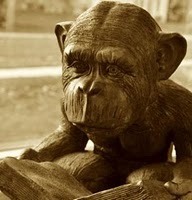 The monkey is not a fan of arachnids.
The monkey is not a fan of arachnids.The monkey is definitively not a spider monkey. Look at that face. No spider there.
The monkey appreciates what they do, please don't misinterpret the monkey.
But spiders give the monkey the willies.
The Dead Path
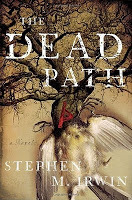
by Stephen Irwin
Knopf Doubleday, 2010
It may be trite to note Stephen King in any review of a horror novel not written by Stephen King, but such is the world we live in. King changed the face of horror, and such mentions are almost mandatory at this point, so no apologies will be forthcoming, nor necessary.
Anyway, remember IT? That lovely, epic tome of childhood travails and adult nostalgia, all wrapped up with a monster so hideous and vile and genius in execution that King has, to this day, never topped it? There was a scene late in the 1000+ pages that has always stayed with me, haunting my subconscious with promises of terrors so delicious that Hell itself seems a summer day camp by comparison. No, not Pennywise, but good guess, clowns are always a safe bet for unspeakable evil (see also: The Pilo Family Circus).
 In this small tableau (SPOILER ALERT), the villain has been unveiled as being a giant spider (or something so akin in form that our tiny human minds fill in the blanks lest they be overwhelmed by the unnameable horror that confronts them). It turns out that the beast is pregnant, and has laid eggs throughout its subterranean lair. One of our heroes takes it upon himself to smash every egg, which unleashes a slightly squashed (but still abnormally large) baby spider which the hero is obliged to finish off with the heel of his shoe. There are many, many eggs, and soon the hero has run out of matches to light his way with, and he continues his unholy and gruesome task in the dark, feeling out and squishing giant spiders with his gore-soaked feet.
In this small tableau (SPOILER ALERT), the villain has been unveiled as being a giant spider (or something so akin in form that our tiny human minds fill in the blanks lest they be overwhelmed by the unnameable horror that confronts them). It turns out that the beast is pregnant, and has laid eggs throughout its subterranean lair. One of our heroes takes it upon himself to smash every egg, which unleashes a slightly squashed (but still abnormally large) baby spider which the hero is obliged to finish off with the heel of his shoe. There are many, many eggs, and soon the hero has run out of matches to light his way with, and he continues his unholy and gruesome task in the dark, feeling out and squishing giant spiders with his gore-soaked feet.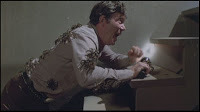 Yeah, I got shivers just writing that sentence. Me and spiders go way back, and while I have matured to the point where I can watch Arachnophobia without screaming, where I can truly giggle at Shatner combating the Kingdom of the Spiders through sheer force of ham, where I can scoop up small ones in my hand and deposit them outside, any arachnid bigger than 5 or 6 millimetres in diameter gets me reaching for the tissues. And once, outside when I was burning weeds on my driveway, a flamethrower. Trust me, it was that freaking big.
Yeah, I got shivers just writing that sentence. Me and spiders go way back, and while I have matured to the point where I can watch Arachnophobia without screaming, where I can truly giggle at Shatner combating the Kingdom of the Spiders through sheer force of ham, where I can scoop up small ones in my hand and deposit them outside, any arachnid bigger than 5 or 6 millimetres in diameter gets me reaching for the tissues. And once, outside when I was burning weeds on my driveway, a flamethrower. Trust me, it was that freaking big.So, in a nutshell; Stephen M. Irwin's new novel The Dead Path made me squirm. A lot.
And it starts so innocently, spider-wise. Nicholas Close is a haunted man, quite literally. After an accident which inadvertently takes the life of his wife, Nicholas can see the dead; or rather, the last moments of the dead, the last few minutes of the lives of persons taken too soon, repeating their final acts:
Distraught, bewildered, he returns to his hometown where, as a child, his best friend was abducted and murdered. Upon his return, new disappearances begin, and Nicholas begins to suspect that there might be something far more sinister than child abductions at play. Something old and evil lives in the woods, something that preys on the weak, something that, as hinted above, controls spiders as we would control puppies. Something that, in Dark Path's more horrific moments, had me scratching at invisible insects crawling over my skin. And something that, after one of the more grisly encounters, Nicholas knows cannot be stopped, or even be told.Now, in those silent attics, garages, basements, and back rooms, behind boarded windows or under musty eaves or paused on damp cellar stairs, he watched empty-eyed men throw ropes over rafters, thin farmers ease their yellow teeth over phantom shotgun barrels, tight-jawed mothers stir rat poison into tea, young men slip hosing over invisible exhaust pipes . . . over and over and over...[The] ghosts, in return, took no notice of their living landlords, spouses, children, enemies . . . yet their dead eyes rolled to stare at Nicholas. They knew he could see them.
Like King at his best, The Dead Path excels at presenting realistic figures caught up in supernatural occurrences. The theme of a town beset by an ancient evil is not exactly new (see, again, IT, or Dan Simmons' similarly spectacular Summer of Night), nor are the concepts of ghosts, Pagan rituals, and fate, but Irwin treads these well worn paths with verve. As the plot motors from daytime normalcy to unsuspected witchcraft, heading toward the final, unavoidable showdown, Irwin expertly balances the smaller character moments and the larger moments of unadulterated horror, keeping the creep factor constant throughout.The old woman knew there was no room in a sane world for stories about huge spiders and Brothers Grimm strawberries. A retelling of what happened would sound like the babblings of a madman. No, she knew there would be no police.
The Dead Path does not break new ground, and it does lose some steam in its final pages, a dilemma it shares with most novels I've read of a supernatural bent, how to actually end the carnage effectively when dealing with a well-nigh unstoppable force. Yet Irwin proves his mettle through a canny mixture of believable personalities and some truly dark and disturbing vision. The Dead Path is a solid, spooky read, perfect for a few nights worth of shiverings.
And also; spiders. So gawd-damned many of them.
Verdict: SPIDERS! THEY'RE ALL OVER ME! AUGH!
November 11, 2010
Shelf Monkey manhandled by Canadian television actor!
Nevertheless, asute viewers informed me that my beloved, oh-so-close-to-national-debate-worthy novel Shelf Monkey made its national television debut! I quickly found the show online and, while I currently do not have speakers with which to hear the dialogue as I write this post, I think we can extrapolate the major plot elements from these few images.
Here, we see the character of Kai Booker (played by Sebastian Piggot) waiting for Erica (Erin Karpluk) to arrive. He passes the time in the best manner possible; by perusing favourite passages from his well-worn copy of Shelf Monkey...
"Hmm, yes. Interesting."
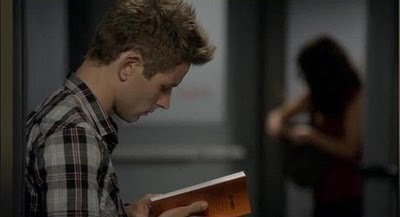 "Oh, hey, Erica, I was waiting for you. You ever read this novel Shelf Monkey? Changed my life! You'd be perfect for Danae! I could play Thomas! Let's put on a show, whaddaya say?"
"Oh, hey, Erica, I was waiting for you. You ever read this novel Shelf Monkey? Changed my life! You'd be perfect for Danae! I could play Thomas! Let's put on a show, whaddaya say?" "Maybe you'd like me to come in and read it to you?"
"Maybe you'd like me to come in and read it to you?"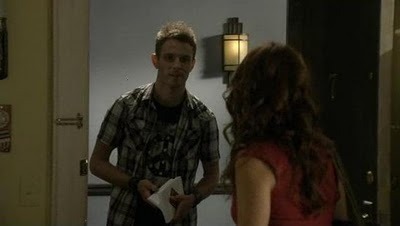 "See, it says here, that literature is a virus. What do think that means? Weird."
"See, it says here, that literature is a virus. What do think that means? Weird." And scene.
And scene.I'm sure that more occurs, but being the vain and self-centred writer that I am, I'm only concerned with myself.
Seriously, quite cool to see, even if the book isn't integral to the plot. Thanks, CBC prop personel, you've made my day.
October 31, 2010
Canada Reads 2011 - preliminary thoughts
 At the risk of fanning the flames of controversy, I'd like to take a moment to discuss Canada Reads 2011.
At the risk of fanning the flames of controversy, I'd like to take a moment to discuss Canada Reads 2011.And please note: I am hardly a disinterested third party here. As my novel Shelf Monkey is in their rankings of the Top 40 Novels, I do have a somewhat vested interest in the contest.Canada Reads was launched ten years ago by CBC, an effort to bring to attention certain books that each year's jurors wished other Canadians would read. It has always been an imperfect contest, prone to pushing already popular novels out further into the spotlight, but has led to some interesting books receiving a level of public consciousness they might not normally have achieved (Fruit, Brown Girl in the Ring, Natasha and Other Stories etc.).
As some of you likely know, this year the organizers behind Canada Reads have altered its format, allowing Canadians to personally vote for the one book they wished everyone would read. From this list, the top 40 selections would be deemed 'The Top 40 Essential Canadian Novels of the Decade.' This decision to change format likely arrived as a result of public dissatisfaction with past years' selections as being a trifle too obvious. Suffice to say, when Oprah has already chosen a book for her club, it has reached a level undreamed of by most, and gets read all over the continent. Doing a Canada Reads debate on that book, regardless of its quality, seems a touch superfluous.
Already, this new format had major flaws, akin to any such lists. Voting in such a venue is a crapshoot at best, with already well-known novels likely to dominate, and smaller novels falling by the wayside unless the author/publisher makes a conscious decision to personally push a novel to get on the list.
And this is exactly what has happened; I'm proof of that. I did not go out of my way to solicit votes from strangers, I did not purchase billboard space, I did not launch attack ads against Joseph Boyden. I simply put up a public Facebook page and invited friends to vote for me, and put up a blog post as well (and if you did indeed vote for me, my deepest thanks to you and yours). If others wanted to join in, so much the better. But by focusing a group of willing participants to vote for one single novel en masse, I squeaked in and got on the list. The Top 40 is chock full of well-known, best-selling authors (and I do not mean to slight them, these are quality novels), but by virtue of a coordinated attack (the closest I'll ever get to reaching a level approaching competitiveness), both myself and number of other, lesser-known quantities such as Chris Benjamin and Leo McKay got ourselves prime positions on the list.
Frankly, I don't see anything wrong with this. In today's environment, it's increasingly hard to get recognized, and every little bit of publicity helps. I don't consider this hucksterism, or akin to prostitution (a charge leveled on me and others by a few bloggers); I consider it an opportunity, for free advertising if nothing else. Being that Canada has a few very large publishing companies that dominate the sales lists, us small-time hoods have to step up once in awhile to make ourselves heard. And besides, just being on the same list as Atwood, Boyden, Vanderhaeghe , Martel, and Shields is a thrill unto itself.
It's all silly anyway. Really, 'Top 40 Essential Novels?' Such a list is impossible to define, prone to massive subjectivity, and is far better used as a marketing ploy than a definitive collection. Which is what I suspect this all is; you can't deny, people are talking. At least, people who follow Canada Reads. If, as they claim, they had over 6000 votes, that's a sizable contingent of literary lovers.
From the Top 40, the original plan was for the five unnamed jurors to chose their Top 10, and then from those the five they would debate together on national radio in 2011. Now, at literally the last minute, Canada Reads has changed the conditions of the test, and left it to the public to decide the top 10. After the cutoff date of November 7, 2010, the as-yet-unknown jurors will be forced to choose their selections from that much smaller list.
This new decision has led to both enthusiasm and outright condemnation, and without meaning to appear wishy-washy, I do see both sides here and heartily agree with both arguments. By limiting the choices, presumably at least one of the jurors will end up with a novel he or she does not actually care about in the slightest, which could lead to a less-than-enthusiastic debate. And conceivably, as they were not declared verboten, the Top 10 could be made up entirely of past winners and nominees, leading to, again, a less-than-riveting chat about books we've all already read (or are at least familiar with).
This is a real risk, and I agree, the format this year is hardly ideal. The Top 40, while a very strong collection, is very possibly going to be whittled down to an unimpressive line-up of already popular titles. This is what happens when a large amount of people are polled, the result ends up rather homogenized in nature. I sometimes wonder, if this list included American novels, would Dan Brown have made the cut? I fear so.
But I cannot tell a lie (unless you count writing fiction as telling lies, in which case, I am an inveterate liar): I'd like to get into the top 10. I do not hold my breath on this possibility, I've already beaten the odds to get this far. But I like it when people read what I've written. I like it when people buy my book. Am I going to return the $4.00 in royalties I've made so far on Amazon.ca for sales since the Top 40 announcement? I am not, and to come out against the Canada Reads format this year would be supremely hypocritical on my part.
But what if? That's the question. Laying aside my own selfish concerns for a moment, what if we could get the list we want? Look at the Top 40 as it stands now: these are terrific fictions, and while some have arguably had their critical/commercial days in the sun (and not to take away anything from their accomplishments thus far - I think it part of the Canadian condition to distrust those who have achieved a certain level of success, but I will not succumb, I truly love many of these fine best-selling works), there are others so gawd-damned deserving of wider recognition that I salivate at the thought of a Canada Reads debate on their merits.
Think of a Top 10 like this:
Inside by Kenneth J. HarveyCome Thou Tortoise by Jessica GrantSkim by Mariko Tamaki and Jillian TamakiThe Best Laid Plans by Terry FallisPattern Recognition by William GibsonBottle Rocket Hearts by Zoe WhittallConceit by Mary NovikElle by Douglas GloverThe Fallen by Stephen FinucanMoody Food by Ray RobertsonNow that would be an interesting selection. Some well-known, some esoteric, all winners, all deserving.
Do I wish that the overall list was different? Of course. I wish desperately that past winners and nominees were ineligible, to lend more space to deserving books. I wish Minister Faust has made the list; ditto John McFetridge, Peter Darbyshire, Andrew Kaufman, Emily Schultz, and Jonathan Bennett, amongst many, many others.
But I don't make the rules, I only work within them, so all I can do is work my small part of the world and hope that it is enough, and enjoy whatever fame/notoriety I can.
So if you want, please ignore Canada Reads this year, it won't hurt my feelings one bit. But if you are going to vote, vote wisely. Start up your own campaigns for your favourite novels. Let's do our best to sneak a few outsiders on the list.
And if I turn out to be one of the outsiders, I won't complain.
October 24, 2010
Monkey droppings - Elle by Douglas Glover: "When the New and the Old Worlds meet, first we exchange corpses."
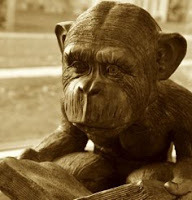
Today, the monkey continues his chimp-love of a Canadian literary master.
Elle
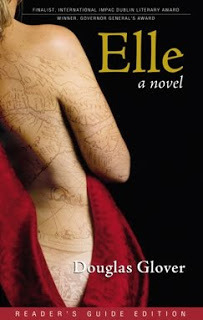
by Douglas Glover
[WARNING: THE FOLLOWING QUOTE IS LIKELY NSFW. ALSO, IT IS AWESOME.]
Now that is an opening paragraph to be reckoned with.Oh Jesus, Mary and Joseph, I am aroused beyond all reckoning, beyond memory, in a ship's cabin on a spumy gulf somewhere west of Newfoundland, with the so-called Comte d'Epirgny, five years since bad-boy tennis champion of Orleans, tucked between my legs. Admittedly, Richard is turning green from the ship's violent motions, and if he notices the rat hiding behind the shit bucket, he will surely puke. But I have looped a cord round the base of his cock to keep him hard.
A few months ago I came across a copy of Douglas Glover's Precious, a novel I had always been meaning to read. I found it an utter delight, a Canadian hard-boiled noir that ranks with the best of Raymond Chandler and Ross Macdonald. Thus emboldened, I picked up a copy of Elle, somehow expecting more of the same.
Witness my shock, then, at not only the opening paragraph (see above), but at the content, as far at odds with Precious' subject matter as you can get. Imagine discovering that Dashiell Hammett also wrote Naval histories; that weird.
And double my shock at this; Elle is very likely a masterpiece, a breathtaking, bold, coarse, witty, sexy, mythic, and scatological take on Canadian history unlike any historical novel I have ever read. Keep in mind I'm not a historical fiction type of guy, all told, but still: wow. This may be my favourite historical novel of all time.
As you can see from above, Elle starts with a bang. The narrator (only known as Elle) is on her uncle's ship, travelling from France to Canada in 1542. Elle is a desperately intelligent woman, and is prone to questioning all that is somehow taken for granted in her world:
Elle may be too smart for her own times - "Like many women, I know what I don't know - a duplicity of mental operation caused by living in a world run by men and Dominican priests." - and her unusual nature makes her prone to condemnation. After being caught with her lover by her uncle, Elle is quickly set ashore in the Canadian wilderness along with Richard and her nurse.In Orleans, in 1542, there are forty-three tennis courts . . . it makes you think. There are only thirty-seven churches. Yet we burn Protestant heretics (also horse thieves, book publishers, books themselves and the occasional impolitic author when we can get one) and not maladroit tennis players. What one is to make of this odd circumstance, I cannot say.
Her companions quickly perish, but Elle, stripped from her high European upbringing, somehow manages to survive the harsh new terrain:
Elle soon discovers that the new world is scouring her of her past, making her into something more than she ever thought possible. She is stronger than she ever thought, evolving into something new and unseen, something harder that the world may be unprepared for.I have made many mistakes. I blame printed books for this, a recent invention which has led us to solitary pleasures: reason, private opinions, moral relativism, Lutheranism and masturbation.
What Glover accomplishes in Elle is something wonderful and rare; he makes Canadian history come alive. I don't mean to say that the novel is completely factual (although it is based on certain historical accounts); I mean that in a genre often typified by ponderous tomes of deep research and accuracy at the expense of narrative drive (I'm looking at you, Parrot and Olivier in America), Elle is, gosh darn it, fun. It's a lively beast, this book, with a story that leaps off the page. It moves, it breathes, it zigs and zags with glee, and goshdarnit, it breaks your heart. And while Glover keeps a light touch, Elle is hardly insubstantial, with a breadth of compassion and drama that puts most other novels to shame, historical fiction or not.
I'm not much for high-toned reviews; I like them, but I don't think I'm smart enough to complete one on my own without a lot of advance prepwork. I read this book for pleasure, and believe me, I was pleased. So I'll leave it at this: Elle is an amazing piece of work.
VERDICT: MONKEY LOVES
October 17, 2010
The Husk Chronicles, Episode One - ACCEPTANCE
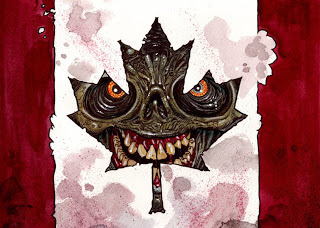 My, Corey, what an intriguing post title.
My, Corey, what an intriguing post title.And what a nauseating image (courtesy of Rob Sachetto's Zombie Daily blog).
What's it all about?
Well, you may have noticed a marked decline in the posting of posts on this here website. Frankly, I've been rather busy. The new job as publicist for Goose Lane Editions keeps my brain a'popping, leaving me with scant energy at the end of the workday. I do what I can, but I am at heart a lazy man who needs serious downtime.
And now, the posts may be coming with even less regularity, although I will do my best to update, review, and whine. Another element has been added to the mix, one which will definitely eat away at my time, time usually spent watching House or 30 Rock. You see, after years (no hyperbole here, folks, bloody years) of wait, and work, and false starts and restarts, the almost unthinkable has occurred. Corey Redekop, your one and only favourite writer of novels and blogs entitled Shelf Monkey, has had his sophomore novel accepted for publication.
Now, now, put away your wallet, stop searching online for the best price. It will be some time before Husk (that's the title) reaches shelves. We're talking 2012 here, so you have plenty of time to start putting away the pennies. Why, just saving a dime a day will put you so far ahead you'll be able to afford two copies. Good for you, good for me.
But this will mean much time and effort be placed into editing, which goes on and on and on, and as a result, less reviews. I will desperately try to keep all three of you still reading this sentence entertained and informed, but no guarantees.
And the image? Suffice to say, Husk is not (despite some pleas from earnest fans) a sequel to Shelf Monkey. It is, rather, what I refer to as the Great Canadian Zombie Novel (hence the image). I feel I'm on pretty solid ground with that claim; there simply haven't been that many Canadian zombie novels, certainly not written from the zombie's POV. There was a small segment of Max Brooks' World War Z set in Canada, and Joey Comeau's One Bloody Thing After Another had its fair share of undead mayhem, but that might be it. Except for Tony Burgess' Pontypool Changes Everything, a gutbusting masterpiece, but really so much, much more that a 'zombie novel.'
So, prep yourselves for the 2012 release of Husk. I'll be blogging updates on my progress, as well as other things that entertain/infuriate me.
And if you can't wait until 2012, consider voting for Shelf Monkey at the CBC Reads nomination page, on until October 26. It'll help pass the time.
October 5, 2010
Get me on Canada Reads!

As many of you may know, a few years ago I published a little tome entitled Shelf Monkey (hey, that's the title of the blog! Drink!). It was fairly well-received, had a nice shelf life, and now gets me into parties with a good opening line. "Yeah, I wrote a book once..."
Well, I'd like to extend my fame a little farther, if I may. Some would do this by, oh, writing another book (which is definitely coming - more later!). But right now, I'd like to get a little more recognition for my debut, praised by a cousin as being "pretty good. I wouldn't read it again, but...yeah."
Here in the great wilderness of Canada, we have what has quickly become an annual tradition of arguing over and then reading the same book from coast to coast. It's called Canada Reads, and normally, the books nominated for debate are chosen by that year's celebrity judges. Very often, famous books are chosen, and well-deserving publications by smaller presses fall by the wayside. However, this year, the rules have altered, allowing me one slim chance of sliding through to victory.
This year, the public can vote.
That's right: this year, anyone (meaning all of us) can write in with our personal choices (limited to the last ten years). From that list, the top 40 will be proclaimed as "the Top 40 Essential Canadian Novels of the Decade." Heady stuff, but there can be only one. From those forty, the five judges will choose one novel each to argue over on national television and radio, resulting in one novel to rule them all.
Whoa, Highlander and LOTR references, both in one paragraph!
So, please, vote for Shelf Monkey. I don't ask for much, God knows. I hold no illusions as to winning, but to get in the Top 40 would be a coup.
Click here to vote. And win prizes, did I forget to mention that? Awesome prize packages are available.



